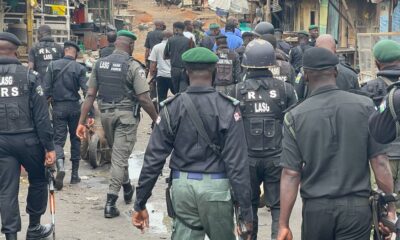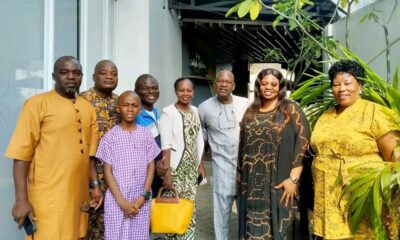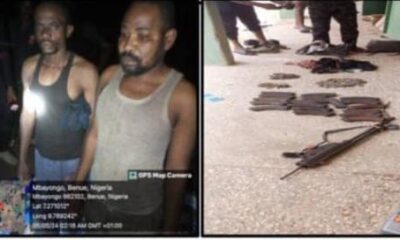Benue news
Terwase Akwaza’s ghost

I wept in a dream when I went to bed yesterday, after the sad news of the murder of Terkula Suswam reached me. I found myself telling some associates I was weeping for Sankera. We have recorded many deaths and Terkula’s, a condemnable homicide, is another sacrifice -a metaphor of the debilitating security in Sankera area of Benue State. Truth is, our boys and political leaders have failed us.
I was home during the weekend. First, the federal government has neglected the road for years to tear into potholes that make cars tumble. From Takum to Gbise -just a few kilometres, I counted no fewer than 18 military checkpoints. No vrooming of a vehicle. Some dwelling places deserted. This essayist hails from Gbise, where many homes have been reduced to ashes by both militia gangs and the armed forces. The atmosphere there is that of trepidation. It was in Tor Donga, Harga and Abaji settlements that I saw a few cars passing, each overloaded with passengers.
Of recent, the Shitile people buried one of their community elders, Francis Zaaya, in his Yooyo ancestral home. Some illustrious sons were present to pay their last respect. As mourners dispersed, militia men wielding guns were spotted nearby. Their mission was not known. Soldiers boomed the air with unbroken gunshots that sounded for several minutes, to stop them from marauding. The mourners trembled, hurtling helter-skelter. The gunmen, without returning fire, retreated to their base. No death was recorded, but a woman got injured by a stray bullet from the troops.
Before Zaaya’s burial, Benue state government had imposed a dusk-to-dawn curfew in Katsina Ala and Ukum councils of Sankera. The use of motorcycles has also been banned. Authorities said the measures would help decimate criminals. But the episode at Zaaya’s burial signaled that the presence of military troops, the curfew imposed and okada ban would not address the insecurity in Sankera.
Motorbikes are the major means of transportation in this country. In Sankera, farm produce are conveyed mostly on motorcycles to the markets. If you want to worship in the village, attend a marriage ceremony or burial, bikes are the easiest means. In the remotest areas, even the dead and coffins are carried on bikes. There are no access roads and only a few residents can afford a motor vehicle. Camels and donkeys are not used. In the early 1970s, my father rode a power bike 175, which he borrowed from his boss in office, from Katsina Ala to Yooyo to seek the hand of a Princess in marriage. The conjugation between the two gave birth to me. That fruitful trip will not be possible this time. 90 percent of the residents are back to the ancient time of trekking. And they must shelter-in-place at 8.pm until dawn.
A story was told of a man who, unaware of the okada restriction, rode a motorbike to a market to get a piece of pork meat for evening meal. He was stopped by soldiers who seized and burnt his motorcycle. There are allegations that some of the soldiers have turned to hulks of bully to innocent persons. They don’t want to see young men with tattoos like Ibrahimovic, wear rough jeans like Lady Gaga, carry dreadlocks like BBN winner, Laycon. There are allegations that the soldiers extort commercial drivers and sometimes arrest innocent persons.
The ban on okada came after the chairman of Katsina Ala council, Atera Alfred, was attacked by gunmen on Christmas eve. He was lucky but six persons were feared killed. Few days later, three relatives of ex-Assembly member, Ianna Jato, were killed and his home in the village set ablaze. Earlier, many others, including my village head Zaki Ambe were killed by militia men. This writer had condemned all the attacks and killings.
Worried by the killings, some clerics and traditional rulers organised a prayer-meeting at Tor Donga to tackle the problem spiritually. Sen. Gabriel Suswam and other political elites attended. It was reported that Suswam was tough in his speech, his words spraying vitriol. His face flushing with anger, he couldn’t capture the hearts of the bandits. Instead, he warned he would deploy more troops to neutralise them. 24 hours after Suswam left, the militia killed a policeman at a checkpoint and carted away his riffle. It means the prayers did not work. The police, instead of going after the culprits, torched houses, including food stuff, in Ucha and Kumpa villages, how not to protect lives and property.
Terwase Akwaza’s murder comes to mind. Terwase, a.k.a Ghana, both in life and death, figures prominently in the security challenge confronting Sankera. However, our clerics and monarchs were able to overwhelm Terwase with love and sermons. He repented and led other 172 goons to lay down arms. Sankera was on the road to peace. Unfortunately, the peace process was truncated when the military ‘seized’ Terwase and some of the other repentant criminal commanders and summarily executed them. The military showed us a gory picture of the late militia leader, bullets pockmarked his chest, his right hand mutilated. Many condemned his execution. A source shared with me a message which Terwase sent through a stakeholder to Governor Ortom when he repented. He asked Ortom to forgive him; should not give him appointment like in the first amnesty, and should fly him abroad and enroll him for studies, “even if it’s an adult school.” When Ghana was killed, I perused through the book of time and wrote that the remaining repentant criminals will crawl back to their terrorists enclaves for more barbaric missions. What happened? They are the ones who have regrouped and returned to their old ways.
In all of this, innocent people are the ones bearing the brunt. When others were afraid, Terkula, a humorous good jolly fellow, went home because he had done no one any wrong. Like many of those killed, he is a victim of transfer of aggression. Where were the soldiers when the gunmen, cruising a small car, gunned him and one of his aides down just opposite the gate of his home in Anyiin, in spite of a military base nearby? Where were the soldiers when the gunmen, decked in military camouflage, invaded the Katsina Ala chairman’s residence in day time, unleashed terror and left freely? Our boys have become like cyborg assassins in Schwarzenegger’s The Terminator. We cannot continue like this. The killings, kidnappings, armed robbery and other criminal activities must stop. As if poet Amanda was referring to Sankera during Joe Biden’s inauguration as US 46th president, when she crooned: “let us lay down our arms so we can reach out our arms to one another. Let us seek harm to none and harmony for all.”
Is it not a big shame that our traditional rulers have fled their homes? Our land has been polluted by blood from primitive slaughter. The Scripture says God abhors human sacrifice. At the psychological moment, a ram appeared. And God told Abraham to free Isaac unhurt and sacrifice the animal. Before then, the boy (Isaac) asked his dad where the lamb was for the sacrifice. So, why are our boys killing people? Revolution? No. Vengeance? Terwase Akwaza did not ask anyone to take revenge on his behalf. His ghost will not come to torment. His parting oration was to “die with Jesus,” for peace to return in Sankera. And I expect him with Christ in Paradise like the penitent thief on the cross.
We need truce to heal the wounds, purify the land with peace and return to those years of production and bountiful harvest; markets for all. Military troops are eliminating some of these criminal elements, but they cannot kill all of them no matter how gallant they may claim to be. Also note that continuous killing of young men in a community is counterproductive. I am told there is a frosty relationship among the goons over who now becomes commander-in-chief. So, while they are killing one another, soldiers are decimating them. If they say they are angry with the leaders who used and abandoned them, how can they oppose them through the ballots when they are been killed, when they continue to run in the bush like outcasts? My message is: live and let’s live peacefully. How can you elect good leaders who will protect your interest, bring development and generally govern well if you are not reintegrated in the society as law abiding citizens? Without a strong and formidable lawful youths, the same people you are rejecting will bounce back on the plebis scitum on military power during election. Truth is, these boys have disgraced us with their bad ways. The politicians who patronised them are also guilty of the crimes they are committing, the tears and destructions caused.
It is high time we threw the unhappy past behind us and move forward peacefully. Some of the leaders have been pulling us back because of their squabbles with Jonathan Agbidyeh who represents Katsina Ala east in the State Assembly. That must stop. We must forgive one another and mend fences before God will grant our quest for peace. Those saying the criminals are Agbidyeh’s boys because they supported the APC that gave the lawmaker victory at the 2019 poll are wrong. The same boys toted riffles to give Buhari victory in the area. Are they Buhari boys too? Some of those complaining had also used these boys in past polls to win political offices. Agbidyeh has to be supported by blameless people in canvassing for peace. It is not about who gets the glory. It’s not about APC, neither PDP. Good news is that Governor Ortom has now been detailed the truth about what is happening in Sankera. A few honest persons spoke and the true gist got to his listening ears.
With the governor’s permission, Agbidyeh yesterday met with traditional rulers, as he planned to meet with teachers and other stakeholders today. The meetings were planned to clear the weeds of hostilities for peace to be cultivated. Sadly, as the meeting was ending, news of Terkula’s murder filtered the air.
But that should not deter us in our peace efforts. Security is the responsibility of every concerned person. If we don’t tackle the problem by ourselves today, even military troops will not fix it for us and the fire of violence will consume everyone directly or indirectly. So, what we need is reconciliation, (not negotiation) to be followed by rehabilitation and reconstruction (RRR). To alleviate the suffering of innocent people, Ortom should lift the ban on motorcycles and monitor the response. If Ortom cannot lift the ban, he should supply tricycles. In 2012, when a suicide bomber on a motorcycle hit a police convoy in Jalingo, killing 11 persons in explosion, the late Governor Danbaba Suntai stopped the use of motorbikes in the state capital. But his tricycles arrived before the ban. It was the same approach in Kano city when attacks on government institutions, churches and mosques by Boko Haram terrorists inspired the banning of motorcycles. With commercial motorcycles, a youth could put food on the table, cater for his wife and kids or pay his school fees. That source of livelihood has been terminated. Poverty can inspire an idle youth to join a criminal gang. The killers of the former governor’s elder brother did not use a motorbike to strike in Logo. In Katsina-Ala and Ukum where people are trekking, the militants are still riding bikes, it was learnt.
Senkera has been socioeconomically held in the jugular for long a time. It has been in comatose without our leaders showing concern. I know only a few who are bothered, but they are incapable to solve the hydra-headed problem. Security is not all about bullets, bombs and rockets or other military hardwares. It requires more of intelligence sharing and synergy with the community involved. We need a new approach to tackle the security challenge in Sankera. Like Bruce Schneier says, if you think you can fix security problems with weapons, then you don’t understand the problems, neither you understand the weapons, because criminals use the same weapons. Security is for the people, not people for security.
By Fanen Ihyongo





















